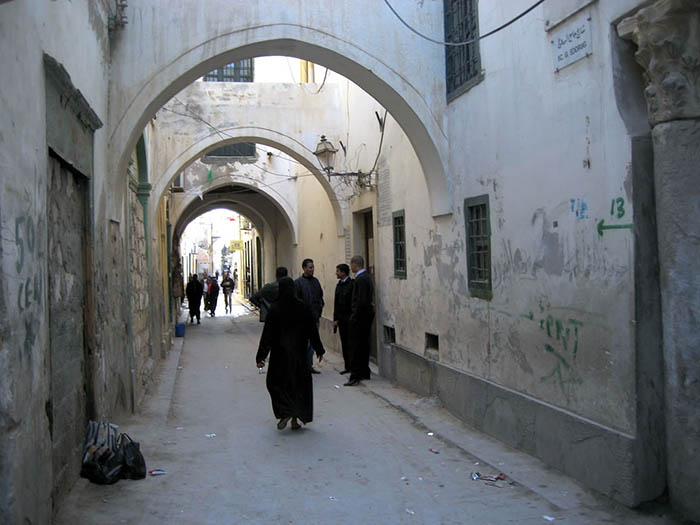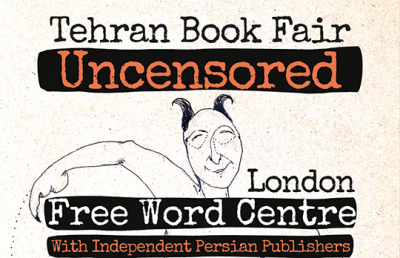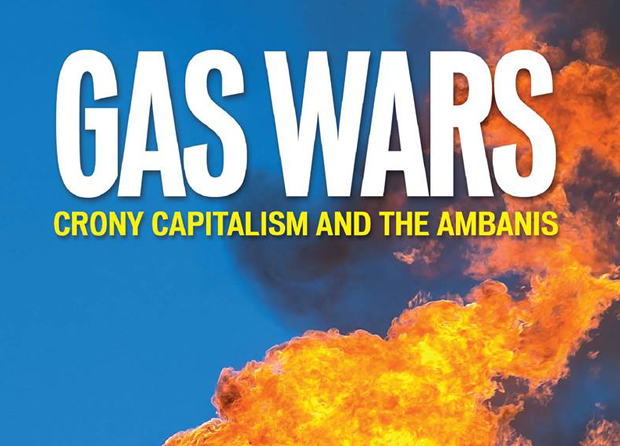Index relies entirely on the support of donors and readers to do its work.
Help us keep amplifying censored voices today.
[vc_row][vc_column][vc_custom_heading text=”The dangers of selling “the wrong” kind of book in Libya are many and varied and yet one chain of bookshops is still open for business. Charlotte Bailey speaks to a bookseller in Tripoli”][vc_column_text]

A street in Tripoli. Credit: David Stanley/Flickr
[/vc_column_text][/vc_column][/vc_row][vc_row][vc_column][vc_column_text]
[/vc_column_text][vc_row_inner][vc_column_inner width=”1/3″][vc_icon icon_fontawesome=”fa fa-quote-left” color=”custom” align=”right” custom_color=”#dd3333″][/vc_column_inner][vc_column_inner width=”2/3″][vc_custom_heading text=”We started selling books critical of Gaddafi. We published a book about democracy” google_fonts=”font_family:Libre%20Baskerville%3Aregular%2Citalic%2C700|font_style:400%20italic%3A400%3Aitalic”][/vc_column_inner][/vc_row_inner][vc_column_text]
[/vc_column_text][/vc_column][/vc_row][vc_row][vc_column width=”1/3″][vc_icon icon_fontawesome=”fa fa-quote-left” color=”custom” align=”right” custom_color=”#dd3333″][/vc_column][vc_column width=”2/3″][vc_custom_heading text=”Forces loyal to Field Marshall Khalifa Haftar were accused of burning 6,000 books” google_fonts=”font_family:Libre%20Baskerville%3Aregular%2Citalic%2C700|font_style:400%20italic%3A400%3Aitalic”][/vc_column][/vc_row][vc_row][vc_column][vc_column_text]
[/vc_column_text][/vc_column][/vc_row][vc_row][vc_column][vc_column_text]
[/vc_column_text][/vc_column][/vc_row][vc_row][vc_column][vc_custom_heading text=”From the Archives”][vc_row_inner][vc_column_inner width=”1/3″][vc_single_image image=”80561″ img_size=”213×289″ alignment=”center” onclick=”custom_link” link=”http://journals.sagepub.com/doi/pdf/10.1177/0306422014535686″][vc_custom_heading text=”Enemies of the people” font_container=”tag:p|font_size:24|text_align:left” link=”url:http%3A%2F%2Fjournals.sagepub.com%2Fdoi%2Fpdf%2F10.1177%2F0306422014535686|||”][vc_column_text]June 2014
Writer Matthias Biskupek took part in demonstrations in East Germany as the Berlin Wall came down. He looks back at the attempts to censor books and theatre.[/vc_column_text][/vc_column_inner][vc_column_inner width=”1/3″][vc_single_image image=”92001″ img_size=”213×289″ alignment=”center” onclick=”custom_link” link=”http://journals.sagepub.com/doi/pdf/10.1177/030642208701600510″][vc_custom_heading text=”The media under Gadaffi” font_container=”tag:p|font_size:24|text_align:left” link=”url:http%3A%2F%2Fjournals.sagepub.com%2Fdoi%2Fpdf%2F10.1177%2F030642208701600510|||”][vc_column_text]May 1987
An interview with Fadel Al-Messaoudi, who believes the media has been directly controlled by the government since the cultural revolution of 1973.[/vc_column_text][/vc_column_inner][vc_column_inner width=”1/3″][vc_single_image image=”94326″ img_size=”213×289″ alignment=”center” onclick=”custom_link” link=”http://journals.sagepub.com/doi/pdf/10.1080/03064228108533267″][vc_custom_heading text=”Censorship and Col Gadaffi” font_container=”tag:p|font_size:24|text_align:left” link=”url:http%3A%2F%2Fjournals.sagepub.com%2Fdoi%2Fpdf%2F10.1080%2F03064228108533267|||”][vc_column_text]October 1981
Libyan journalist exiled in Spain, F. el-Manssoury, reports on soldiers’ accounts of censorship in Libya from first-hand knowledge of the early President Gaddafi’s regime.[/vc_column_text][/vc_column_inner][/vc_row_inner][vc_separator][/vc_column][/vc_row][vc_row][vc_column width=”1/3″][vc_custom_heading text=”Free to air” font_container=”tag:p|font_size:24|text_align:left” link=”url:%20https%3A%2F%2Fwww.indexoncensorship.org%2F2017%2F09%2Ffree-to-air%2F|||”][vc_column_text]Through a range of in-depth reporting, interviews and illustrations, the autumn 2017 issue of Index on Censorship magazine explores how radio has been reborn and is innovating ways to deliver news in war zones, developing countries and online
With: Ismail Einashe, Peter Bazalgette, Wana Udobang[/vc_column_text][/vc_column][vc_column width=”1/3″][vc_single_image image=”95458″ img_size=”medium” alignment=”center” onclick=”custom_link” link=”https://www.indexoncensorship.org/2017/09/free-to-air/”][/vc_column][vc_column width=”1/3″][vc_custom_heading text=”Subscribe” font_container=”tag:p|font_size:24|text_align:left” link=”url:https%3A%2F%2Fwww.indexoncensorship.org%2Fsubscribe%2F|||”][vc_column_text]In print, online. In your mailbox, on your iPad.
Subscription options from £18 or just £1.49 in the App Store for a digital issue.
Every subscriber helps support Index on Censorship’s projects around the world.
![]() SUBSCRIBE NOW[/vc_column_text][/vc_column][/vc_row]
SUBSCRIBE NOW[/vc_column_text][/vc_column][/vc_row]

Join us for the first ever Tehran Book Fair Uncensored in Britain, an event featuring an independent book fair and a discussion on censorship in Iran since the 1979 Iranian Revolution.
Taking place on 6-7 May 2016 at London’s Free Word Centre, the book fair coincides with the Tehran Book Fair, but unlike the Iranian counterpart, it’s free from censorship, and will feature censored books from independent Iranian publishers.
Most of the event will be in Farsi, but there will be an English-language session too on Friday 6 May from 4.30pm to 5.30pm – in association with Index on Censorship and Small Media.
Displayed books will range from novels to social science and from plays to history. Participants will also have the chance to see broadcasted footage from the Tehran International Book Fair, and to get to know the publishers and authors and buy signed books.
Participating publishers at the book fair will include:
The English-language event on Friday 6 May will focus on censorship in Iran and will include a talk from Index on Censorship about its work across the Middle East. During this session, Small Media will also present Writer’s Block, an online interactive data visualisation of censorship in Iran since the 1979 revolution.
The event is free, but booking is required through Free Word Centre’s website.
When: English-Language event with Index on Censorship and Small Media, Friday 6 May 2016, 4.30pm. Farsi events: Friday 6 May 2016, 11am – Saturday 7 May 2016, 6pm
Where: Free Word Lecture Theatre at the Free Word Centre (map)
Tickets: Free, but booking required through Free Word Centre’s website. Tickets grant entry to the fair but the talks cannot be pre-booked – entry to these is allocated on the day on a first come, first served basis (lecture theatre capacity: 90 people).

“Gas Wars — Crony Capitalism and the Ambanis” is journalists Paranjay Guha Thakurta, Subir Ghosh and Jyotirmoy Chaudhuri’s collaborative effort exposing one of India’s biggest business conglomerates’ murky dealings with the government.
The authors detail how a hydrocarbon production sharing contract in Krishna Godavari, off the Bay of Bengal, in Andhra Pradesh, was allegedly rigged to benefit Reliance Industries Limited (RIL) headed by Mukesh Ambani, at significant cost to the public exchequer. The book contends that high ranking government officials, including ministers, aided and abetted the pillage of public resources.
A fire-and-brimstone attorney’s notice from RIL arrived the day after the book was launched. It had quite an eerie feel to it. The notice started with a disclaimer about the Reliance groups’ highest regards for constitutional rights including freedom of expression, and then accused the authors of a deep-rooted conspiracy to malign the company’s reputation. It took strong exception to the book’s title and went on to allege that the contents are nothing but malicious canards. Nothing sort of an unconditional public apology would mitigate the harm caused, failing which, criminal and civil proceedings would be unleashed. Drawing lessons from the Wendy Doniger episode, the notice threw out a wide net. It included not only Authors Upfront and FEEl Books Private Ltd, the e-book publisher and distributors, but also “electronic distributors” like Flipkart and Amazon.in. Even the Foundation for Media Professionals, a non-governmental organisation which forwarded e-invites for the launch event, was not spared. A second notice in the same vein, this time from RNRL, followed soon after.
Why does the book roil the Ambanis? In an interview, Guha Thakurta, one of the authors, revealed that the book delves into how both the central and the Gujarat governments worked hand-in-glove with the Reliance companies in structuring the deal. In effect, the government kowtowed to the companies’ diktats, the authors assert. It went out on a limb to hike the price of gas, and was stopped in its tracks by the Election Commission.
Moreover, it has become a hot-button political issue since the Aam Aadmi Party, which is contesting the elections on an anti-corruption plank, has left no stone unturned to relentlessly question the Ambanis and Gujarat chief minister Narendra Modi, who is running for prime minister. The questions have so unsettled the Reliance companies that they have taken to an “Izzat (honour) campaign” and SMS blitz to convince Indians of its innocence. Further, the companies claim in court that they are victims of a “honey trap”- apparently the government isn’t the custodian of the country’s natural resources and had lured them with false promises.
Guha Thakurta maintains that he has acted in the finest traditions of fairness and journalistic integrity. Senior officials of the companies have been interviewed, their views, refutations and assertions–everything has been presented. But his travails in publishing the book provide cause for consternation. Self-publication was the sole option, if one goes by Bloomsbury India‘s craven surrender. For the record, not only did it withdraw a book which would have exposed how India’s national airline was bled dry, but went ahead and apologised to the minister who threatened to sue for libel. A leading national publisher had been approached, and a deal had been worked out, but Guha Thakurta decided to go solo when substantial changes were demanded.
For Reliance, intimidating anyone who isn’t writing hagiographies of Dhirubhai Ambani–the company’s founder–is par for the course; one is a worse offender for even whispering anything against their cavorting with officials in the top echelons of government. And their modus operandi of silencing criticism reveals the extent of crony capitalism.
In its May 2013 issue, Caravan magazine published a cover story on India’s Attorney General. It bared details about how his opinions to the government were tailored to help the Ambanis wiggle out of an investigation into a graft scandal. Interestingly, three legal notices, each more threatening than the other, reached the magazine in the month of April, demanding complete silence. Caravan took them head on, but not every publisher would have the wherewithal to resist impending SLAPP suits.
The threats to Caravan were benign if compared with what the Ambanis did to “The Polyester Prince”, Hamish McDonald’s 1998 biography of Dhirubhai. The plight of that book is a true testament to the Ambanis’ power of insidious censorship. Incessant threats of injunctions from every high court in India ensured that the book quietly vanished off the shelves.
And why not? McDonald had quoted him — “I don’t break laws, I make laws.”
UPDATE:
If there were any doubts as to the extent of Reliance Industries’ determination to suppress the tiniest whisper of criticism, they are dispelled by the latest fusillade hurled against the authors. This comes in the form of a couple of fresh legal notices laden with preposterous claims and egregious threats.
The first one, dated 22 April, cherrypicks random, disjointed passages from the book to make out a case for libel. Suffice it to say, even prima facie innocuous statements have been included.
Dated 23 April, the second one accuses the authors of malevolent mendacity in publishing and publicising their “pamphlet” (yes, that’s the term used to substantiate the charges of the book being a piece of malicious propaganda), and goes on to claim that even the launch event was designed to malign the companies.
At that event, Guha Thakurta had quoted former Governor of West Bengal Gopalkrishna Gandhi’s statement that “Reliance was a parallel state, brazenly exercising total control over the country’s resources”. But Reliance hasn’t trained its guns on Gandhi; instead it accuses the author of slander. It is not pusillanimity but very sound legal strategy — the modus operandi of SLAPP suits, which the company adopts because taking on Gandhi, a widely respected and renowned public figure, would backfire.
Playing both judge and jury, Reliance determines that a sum of INR 100 crore (10 billion) as “token damages”, to be paid within ten days, would be just restitution. Never before has any plaintiff arrogated to itself such a right even before going to court.
The next claim is much more sinister. The authors are directed to remove all traces of “publicity material” — both in print and on the internet, including the website http://www.gaswars.in/. This patently means that even this particular report has to be taken off. Since when have two corporations been so imperious as to stake claim to sovereignty over the internet?
An earlier version of this article identified the basin in question in the production sharing contract as one Kasturba Gandhi in Gujarat, when it should be Krishna Godavari, off the Bay of Bengal, in Andhra Pradesh. An earlier version also stated that both Reliance Industries Limited (RIL) headed by Mukesh Ambani, and Reliance Natural Resources Limited (RNRL) headed by Anil Ambani, were involved in the sharing contract, when it should only be RIL. This has been corrected.
This article was originally posted on 24 April 2014 at indexoncensorship.org
 A group of students at the University of Qatar have started a petition to remove “inappropriate” books from the university library.
A group of students at the University of Qatar have started a petition to remove “inappropriate” books from the university library.
In a message circulated online, the students state that:
These books which are available with a click of a button call for adultery and homosexuality; they also represent the sin for the youth to seduce them and ruin their morals…We hope that people with conscience would move to get rid of such administrations who brought corruption upon our educational institutions.” (PDF: Arabic)
While specific books were not mentioned, the petition included book covers featuring female nudity.
The university responded with a statement explaining that titles are automatically added to the library through subscriptions to foreign and international publishing houses. They are planning to form a committee to prevent this from happening again, and have put in place a “censoring policy” to be able to “delete the books which are against our culture according to clear standards before they reach the library’s index.”